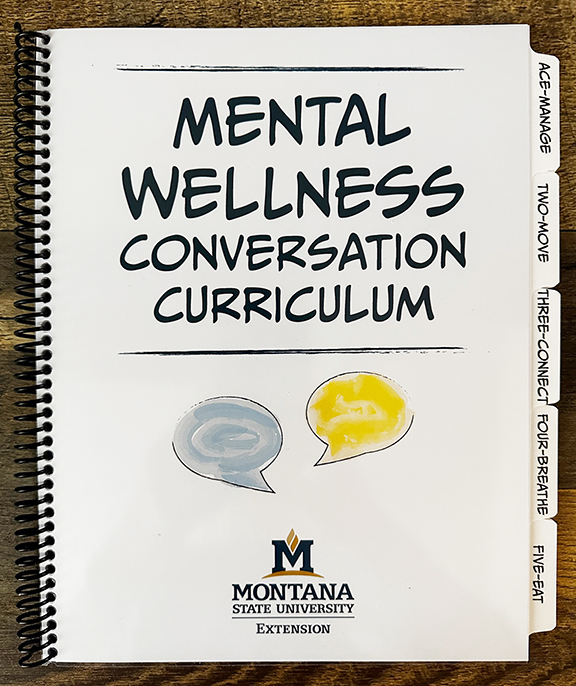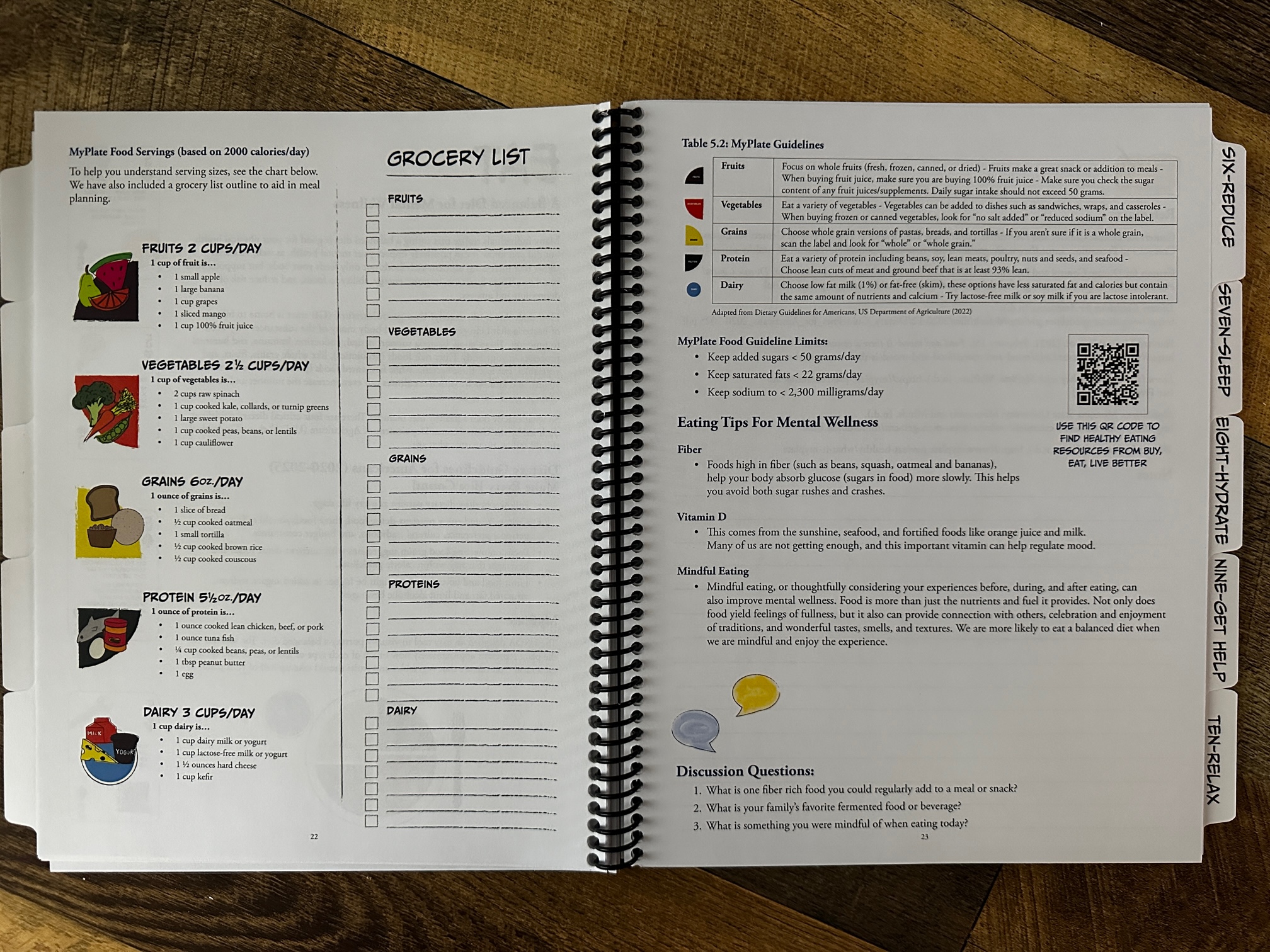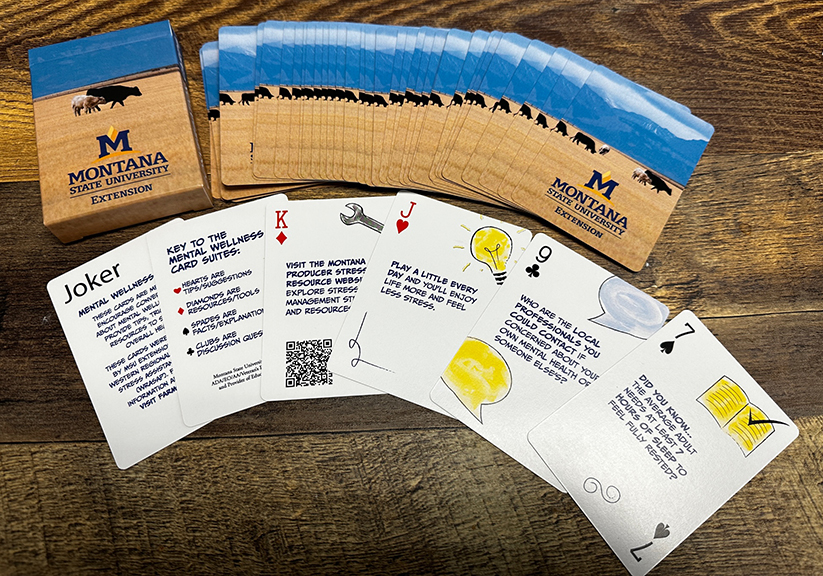Mental Wellness Conversation Curriculum
About the Mental Wellness Conversation Curriculum (MWCC)
Stressors are inevitable. Whether those stressors come from having financial worries, a disagreement with a family member or friend, or simply not having enough time in the day to get everything on your task list done, stressors can often seem endless and overwhelming. Although we often cannot control the severity or timing of these stressors, we do have control over our reaction to them. Learning ways to positively manage our stress can increase the likelihood that these stressors do not negatively impact our mental wellness.
While mental wellness so often becomes the overlooked component of health, it does not exist in isolation. It is inseparably linked to all other components of our health, including our physical health and our social health (our relationships with others). Therefore, in order to make improvements to our overall health, it is critical to give mental wellness appropriate attention.
Although there are many ways to learn some of these positive stress management tools (e.g., via continuing education classes or stress management literature), this project relies on community volunteers (such as yourselves!) to learn this evidence-based information and pass along the knowledge in a non-judgmental way to others in your community via informal, conversation groups.
The Mental Wellness Conversation Curriculum was designed as a two-part tool to support community volunteers in facilitating conversations about mental wellness. The first part is a standard deck of playing cards; the second part is a conversation facilitation curriculum, to be used as a companion guide to the deck of cards.



The deck of cards is structured in such a way that every card (Aces, Twos, Threes etc.) contains information about a particular positive stress management tool. For example, the Eights cover hydration, and provide information about why this is an important part of mental wellness as well as includes strategies to increase hydration. The cards are organized around the following 13 stress management themes:
- Aces – Manage
- Twos – Move
- Threes – Connect
- Fours – Breathe
- Fives – Eat
- Sixes – Reduce
- Sevens – Sleep
- Eights – Hydrate
- Nines – Get Help
- Tens – Relax
- Jacks – Play
- Queens – Calm
- Kings – Learn
Each suit in the deck also corresponds to a specific prompt:
- Hearts – Tips/suggestions
- Diamonds – Resources
- Spades – Information
- Clubs – Discussion questions
All of the information presented on the cards is research-based. To provide more context to the information on cards, the conversation facilitation curriculum was designed as a companion guide. The information and resources in this curriculum provide community volunteers with additional content, examples, and resources for each of the 13 stress management themes. Additionally, at the end of each section, there are three discussion questions listed to assist in facilitating further conversation, as well as references.
Beyond providing research-based tips and suggestions for supporting stress management and overall health, the ultimate goal of the Mental Wellness Conversation Curriculum Project is to encourage conversation at the community level about mental wellness. We believe that as informal, mental wellness conversations become normalized, this will aid in stigma reduction surrounding this topic and simply make it easier for folks to reach out if they, or a loved one, need some assistance or just want to talk.
Please contact us with the form below if you are interested in volunteering to become a mental wellness advocate in your community.
Be well,
The MWCC Team
Have you used the MWCC cards?
If so we'd love your feedback- please click the button below to share your thoughts with us in an anonymous survey.
View the 2025 MWCC Video Series
|
Name
|
Organization/Location
|
Contact Email
|
|---|---|---|
|
Esmerelda Mandujano
|
AgrAbility, UC Davis, MWCC California Representative
|
|
|
Harley Edeluchel, Jr.
|
University of Guam, MWCC Guam Representative
|
|
|
Julie Elliott
|
Colorado State University, Colorado Representative
|
|
|
Clinton Wilson
|
Rocky Mountain Farmers Union, MWCC Wyoming Representative
|
|
|
Katy Breeding
|
University of Nevada Reno, MWCC Nevada Representative
|
|
|
Gayle Gratop
|
University of Arizona Extension-Flagstaff, MWCC Arizona Representative
|
|
|
Ashley Jeffers-Sample
|
University of Arizona Extension-Tuscon, MWCC Arizona Representative
|
|
|
Sonja Koukel
|
New Mexico State University, MWCC New Mexico Representative
|
|
|
Leslie Shallcross
|
AgrAbility, Univerisity of Alaska, MWCC Alaska Representative
|
|
|
Lori Mercer
|
Farm Aid, MWCC Washington Representative
|
|
|
Shelby Jones-Dozier
|
MSU Extension, MWCC Montana Facilitator
|
|
|
Christine Sommers-Austin
|
MSU Extension 4H, MWCC Montana Facilitator
|
|
|
Laura Feltz
|
Blaine County, MWCC Montana Facilitator
|
|
|
Valerie Beck
|
Blaine County, MWCC Montana Facilitator
|
|
|
Kristine Nichols
|
US Army, MWCC Montana Facilitator
|
|
|
Christine Williams
|
Montana Health Network, MWCC Montana Facilitator
|
|
|
Jessica Klamm
|
Montana Health Network, MWCC Montana Facilitator
|
|
|
Melissa Coppock
|
US Army, MWCC Montana Facilitator
|
|
|
Dean Belcourt
|
US Army, MWCC Montana Facilitator
|
|
|
Patricia Renenger
|
US Army, MWCC Montana Facilitator
|
|
|
Renee Blumenshine
|
Gratitude in Action, Laurel, MWCC Montana Facilitator
|
|
|
Brenda Richey
|
MSU FRTEP-Flathead Reservation, MWCC Montana Facilitator
|
|
|
Amanda Williams
|
MSU Extension, Fallon/Carter Counties, MWCC Montana Facilitator
|
|
|
Ashli Darrach
|
MSU Extension, Flathead County, MWCC Montana Facilitator
|
|
|
Veronica Baca
|
MSU Extension, Park County, MWCC Montana Facilitator
|
|
|
Lisa Terry
|
MSU Extension, Glacier County, MWCC Montana Facilitator
|
|
|
Wendy Wedum
|
MSU Extension, Pondera County, MWCC Montana Facilitator
|
|
|
Jackie Beardsley
|
MSU Extension, Custer County, MWCC Montana Facilitator
|
|
|
Maddy Vanderkooy |
WSU WRASAP, Washington Facilitator
|
|
|
Don McMoran |
WSU WRASAP, Washington Facilitator
|
|
|
Gracia Puerto |
WSU WRASAP, Washington Facilitator
|
|
|
Annalyse Sheridan |
WSU Skagit Extension, Washington Facilitator
|
|
|
Debbie Fredricks |
WSU WA State Suicide Prevention, Washington Facilitator
|
|
|
Deb Eidsness |
WSU WA State Suicide Prevention, Washington Facilitator
|
|
|
Cherly Reese |
WSU WA State Suicide Prevention, Washington Facilitator
|
|
|
Rachel Weime |
WSU WA State Suicide Prevention, Washington Facilitator
|
Contact Us to become a Mental Wellness Advocate in your community:
denotes required fields.
The Mental Wellness Conversation Curriculum was developed by MSU Extension under the Western Regional Agricultural Assistance Program (WRASAP) grant. For more information about WRASAP visis farmstress.us.
